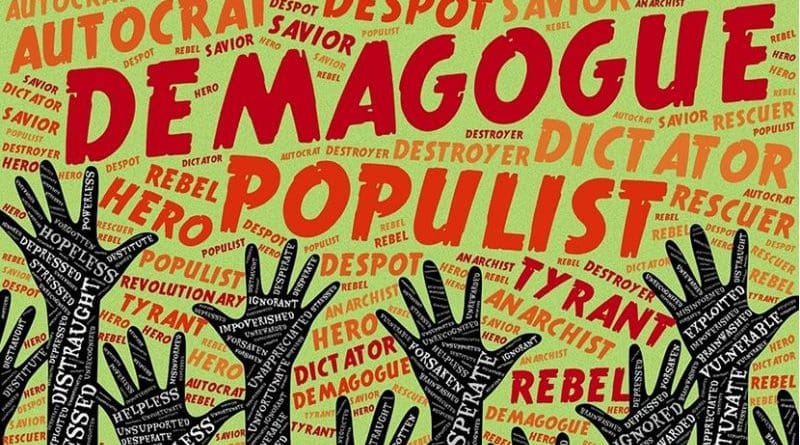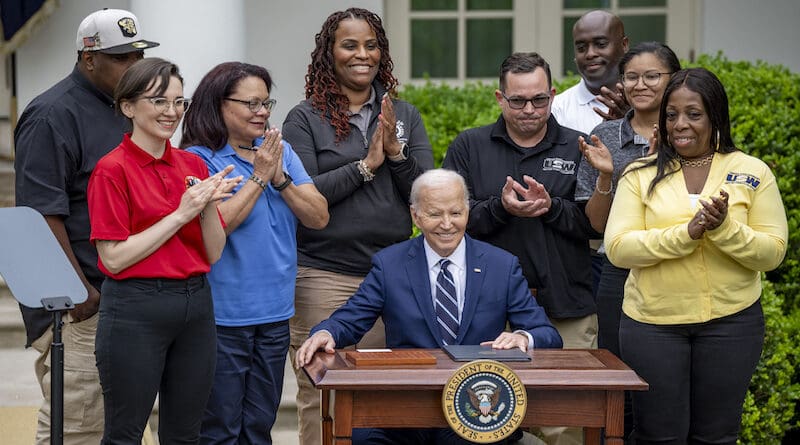Both Trump and Biden imposed high tariffs on imported products made in China and other countries. Those impositions broke with and departed from the previous half century’s policies favoring “free trade” (less or minimal government intervention in international markets). Free trade policies facilitated “globalization,” the euphemism for the post-1970 surge in U.S. corporations’ investing abroad: producing and distributing there, re-locating operations there, and merging with foreign enterprises there.
Presidents before Trump had insisted that free trade plus globalization best served U.S. interests. Both Democratic and Republican administrations had enthusiastically endorsed that insistence. Dutifully performing ideological support duties, they stressed how globalization’s benefits to U.S. corporations would “trickle down” to the rest of us. Globalizing U.S. corporations used portions of their profits to reward both parties with donations and other electoral and lobbying supports.
Our last two Presidents reversed that position. Against free trade they favored multiple government interventions in international trade, especially imposing and raising tariffs. Instead of advocating free trade and globalization, they promoted economic nationalism. Like their predecessors, Trump and Biden depended on financial support from corporate America as well as votes from the employee class. Many U.S. corporations and those they enriched had shifted their profit expectations in response to the competition they faced from new, powerful non-U.S. firms. The latter had emerged during the free-trade/globalization conditions after 1970, above all in China. U.S. firms increasingly welcomed or demanded protection from those competitors. Accordingly, they financed changes in the political winds and shifts in “public opinion” toward economic nationalism.
Trump and Biden thus endorsed pro-tariff policies that protected many corporations’ profits. Those policies also appealed to those for whom economic nationalism offered ideological comforts. For example, many in the United States grasped the relative decline of the United States and its G7 allies in the global economy and the relative rise of China and its BRICS allies. They welcomed an aggressive counteraction in the forms of tariff and trade wars. Both corporations (including mass media) and their subservient politicians worked to build popular and voter support. That was needed to pass the tax, budget, subsidy, tariff, and other laws that would realize the shift to economic nationalism. A key argument held that “tariffs protect jobs.” A political struggle pitted the defenders of “free trade” against those demanding “protection.” Over the last decade, those defenders have been losing.
These days, most candidates and parties perform this particular ideological task for capitalism: persuading Americans that tariffs protect jobs. Note, however, that over the 50 years before around 2015, the same parties and their candidates mostly performed the opposite ideological task. Then they denounced tariffs as unnecessary, inefficient, and counterproductive government interferences. “Free international markets” would, they insisted, be much better for workers and capitalists. However, we need not and should not have been fooled then or now. Neither ideological claim is true.
Free trade profits some industries, but not others. Those that profit rely on exporting their outputs to foreign markets, invest there, or rely on importing products from there. Similarly, tariffs profit some industries (those they protect), but not others. As industries evolve and change, so do their relationships with international trade. Correspondingly, their attitudes toward free trade versus tariffs change.
Capitalist economies almost always pit pro-free trade against pro-tariff protection industries. Their battles vary from open, public, and intense to quiet and under-the-table. Their weapons include bribes, donations, and other kinds of deals offered to politicians mostly by the employers in the interested industries. Both sides also compete to enlist the public and especially voter support—”public opinion”—in order to swing politicians their way. Employers on each side spend millions to persuade the employee class to support their side. Politicians usually split according to which side offers more donations threatens more opposition in the next election, or has spent more to shape public opinion. Each side seeks to prevail, to make government policies favor free versus tariff-protected trade. One way to achieve that is endless repetition by politicians, business leaders, journalists, and academics of one side’s perspective in the hope and expectation that it becomes “common sense.”
Each side’s arguments are driven by their respective industries’ financial self-interest, not any shared commitment to the “truth” about tariffs versus free trade. As we show below, the truth is precisely that neither tariffs nor their opposite, free trade, necessarily protect jobs. At best, both protect some jobs at the cost of losing others. The truth is that we cannot know—and thus cannot measure—all the effects on profits or jobs caused by either free trade or protectionism. So politicians cannot know what the net effect on jobs will be of either free or protected trade policies of governments.
A simple example can clarify the basic points. Chinese auto-makers currently sell high-quality electric vehicles (EVs), cars, and trucks, globally, at very competitive prices. Those EVs can be found on roadways around the world, but not in the United States. That is because, until recently, a 27.5 percent tariff was applied in the United States. For example, if a Chinese EV’s port-of-entry price was, say, $30,000, it would cost a U.S. buyer $30,000 plus the 27.5 percent tariff (an additional $8,250) for a total U.S. price of $38,250. Recently, President Biden raised that tariff from 27.5 percent to 100 percent, thereby raising the Chinese EV’s price for potential U.S. buyers to $60,000. The EU plans similarly to raise its tariff against Chinese EVs from 10 percent to 48 percent, thereby raising the price to potential EU buyers to $44,400.
Those tariffs protect makers of electric vehicles inside the U.S. and EU precisely because those EV makers need not add any tariff to the prices they charge. Thus, for example, if EVs made in the U.S. and EU had cost $40,000, they would have been uncompetitive with the Chinese EVs priced at $30,000. Prospects of profit for them would have been grim. With the tariffs now imposed by the U.S. and proposed by the EU, their EV makers see profit bonanzas. Makers in the EU can raise their EV price from $40,000 to, say, $43,000, and still be cheaper than Chinese EV imports suffering the planned EU tariff and thus priced at $44,400. EV makers in the U.S. can raise their prices to, say, $50,000, sharply improving their profits while still outcompeting Chinese EVs priced at $60,000 (including the 100 percent tariff).
Barring interference from other factors (possible automation, changing tastes for cars, and so forth), we may assume that the raised tariffs increased the profits of EV makers inside the U.S. and EU. We may also assume that those tariffs also saved jobs at those U.S. EV makers. But that is never the end of the story. EV jobs are not the only jobs affected by raised tariffs on EVs.
For example, many corporations in the United States buy fleets of EVs as inputs. Many compete with corporations outside the United States who likewise buy such fleets as their inputs. The raised U.S. tariff seriously disadvantages EV fleet-buying firms inside the United States. Firms inside the United States cannot buy Chinese electric vehicles for $30,000 each. They have to pay much more for the tariff-protected U.S.-made EVs. In stark contrast, their competitors outside the United States can buy Chinese EVs at the far cheaper $30,000 price. It follows that those outside competitors can offer lower prices for whatever products they sell because they enjoy lower (because free of tariffs) input costs. Those firms will gain buyers for their products around the world at the expense of their inside-the-U.S. competitors.
Jobs will likely be lost in such competitively disadvantaged firms inside the United States. While raising tariffs on Chinese EVs may have protected U.S. workers at EV producers inside the United States, it also deprived other U.S. workers of jobs in other U.S. industries competitively disadvantaged by the EV tariff.
In our examples above, U.S. and EU makers of EVs can and likely will raise their prices because of tariff protection. In this way, tariffs tend to worsen inflations. Inflations in turn tend to hurt exports as rising prices lead customers to buy elsewhere. Reduced exports usually mean reduced jobs making such exports.
Still more factors shape tariffs’ job effects. Often “forgotten” by tariff boosters are possible retaliations by affected other countries. Evidence already suggests retaliatory Chinese tariffs coming on imports of U.S.-made large-engine vehicles. If that happens, U.S. exports of such engines to China will shrink or end. Jobs entailed in those exports will also end, offsetting job gains from the U.S. tariffs imposed on Chinese EVs.
Since China is the chief target of U.S. and EU tariff policies it is important to see how China can retaliate in ways that threaten large U.S. and EU job losses. China has now successfully surrounded itself with allies in the BRICS (a total of 11 countries). The economic damage inflicted upon China by U.S. tariffs incentivizes China to offset much or all of that damage by shifting to sell output instead to the world outside of the United States and the EU and especially to its BRICS partners. As China redirects its exports, that will also impact where its imports will be sourced. All those changes will affect many U.S. and EU industries and the jobs they sustain.
Honest economists shrug and plead irreducible uncertainty when asked whether tariffs will “protect” jobs. No matter how hard-pressed or bribed to give a definitive answer, honesty precludes it. Nonetheless, politicians eager to get votes by promising that a tariff they impose will protect jobs can rest easy. They will easily find economists who will give or sell them the answers they want to hear. Trump and Biden did and do.
The implications of this analysis for the U.S. working class are significant. The struggle between free traders and protectionists pits shifting alliances of capitalist employers against one another. One alliance of capitalist employers fights another to win the working class’s votes. Each side promotes its false narrative about what is the best policy for jobs.
The working class should not be fooled or distracted by these free trade versus protectionism struggles among capitalists. Whoever wins them remains profit-driven first and foremost. The ultimate impact on jobs is not a priority for any of them. It never was. The working class’s interest in shaping the quantity and quality of jobs can only be genuinely prioritized if society progresses beyond capitalism. That happens when employees (running democratic worker coops) replace employers (dominating hierarchical capitalist enterprises) in the driver seats of factories, offices, and stores. When employees have become their own employers, they will make the quantities and qualities of a society’s jobs a key policy objective rather than a side-effect of policies focused elsewhere.
- About the author: Richard D. Wolff is professor of economics emeritus at the University of Massachusetts, Amherst, and a visiting professor in the Graduate Program in International Affairs of the New School University, in New York. Wolff’s weekly show, “Economic Update,” is syndicated by more than 100 radio stations and goes to 55 million TV receivers via Free Speech TV. His three recent books with Democracy at Work are The Sickness Is the System: When Capitalism Fails to Save Us From Pandemics or Itself, Understanding Socialism, and Understanding Marxism, the latter of which is now available in a newly released 2021 hardcover edition with a new introduction by the author. Wolff’s new book, Understanding Capitalism, will be published and released this summer (2024) by Democracy at Work.
- Source: This article was produced by Economy for All, a project of the Independent Media Institute.






